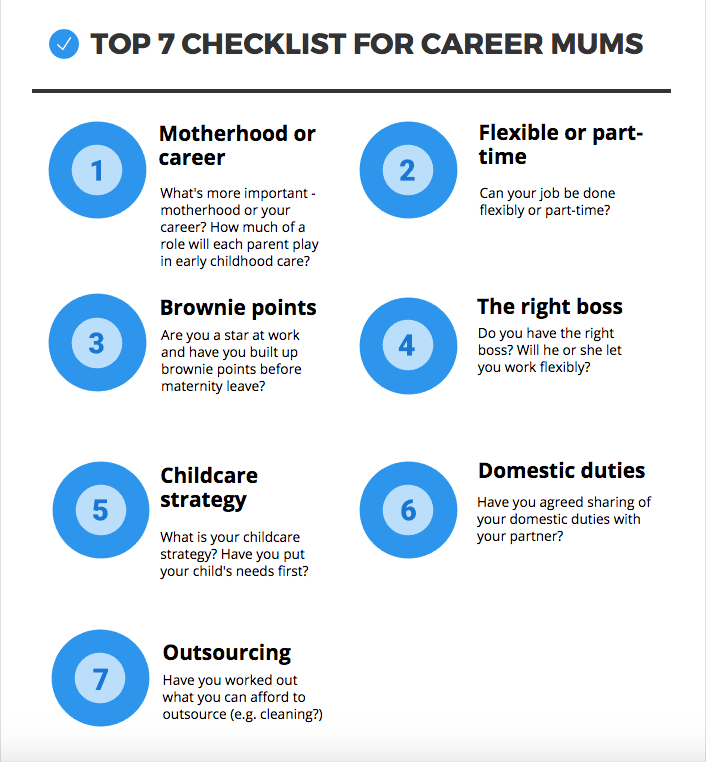Top 7 Checklist for Career Mums

Top 7 Checklist for Career Mums
Being a mum and having a career are both full-time jobs in their own right. So is it any wonder that when we try to juggle them both at the same time it usually leads to feelings of guilt and stress?
If you are just starting off on the motherhood journey, here is my top 7 checklist to help you enjoy both motherhood and your career.
1. Is motherhood or your career your most important role?
The first step is to get clear on your priorities. As Quentin Bryce said “women can have it all, but not all at the same time”. So the reality is you probably need to make trade-offs and it’s best to do this consciously, not sub-consciously. I think that answering this question about what’s more important, will help you prioritise. Motherhood and having a fulfilling career should not be an either/or debate for anyone, however deciding which one will be your most important role will help you to achieve your work/life balance.
Regardless of whether you consider motherhood or your career as your most important role it’s really helpful if you and your partner can discuss both your feelings about this BEFORE you start your family because you really need to work together as a team, both ‘on the same page’, to make juggling kids and a career work!
A good way to help you decide whether motherhood or your career is your most important role is to sit down and take the time to consider and discuss both of your values around balancing motherhood and your career, when you want to start your family, and how much of a role you each will play in early childhood care.
2. Can you work flexibly or part-time?
In my experience as a career mum, I firmly believe that the secret to my long term happiness is part-time work. Working part-time while my children were young has allowed me to both spend time with my children and retain my career. And then as my children have grown I’ve been able to start focussing more on my career.
Although part-time work has allowed me to simultaneously be a mum and an employee, getting the balance right has taken a lot of time, effort, negotiation and planning. If you’re considering having a family some time in the future take a good look at your work situation.
Can your job be done flexibly or part-time?
Are you able to structure job sharing so it works for your boss, as well as you?
You can assist your boss and help build trust by giving as much notice as possible so he or she has time to plan changes. Advise your boss as soon as possible in your pregnancy what arrangements you’d like when you return, as well as when you plan on returning to work after your maternity leave.
Be realistic and creative about working part-time. Can you restructure things to accommodate the arrangements you’d like when you return to work? Are there parts of your job you can transfer to another person or another area? Can you suggest a good person to take over your role while you are on maternity leave?
If you can provide answers and solutions to the questions your boss is going to have to answer once you tell him or her about your baby plans it means you’re offering him or her a solution instead of being part of a problem.
3. Have you accumulated enough ‘brownie points’?
Are you a star at work? Are you perceived by your employer as an employee who consistently delivers high quality performances, brings value to the company and is regarded for your professionalism?
You can accumulate brownie points by:
- developing a consistent reputation for excellence and productivity
- excelling at your job
- taking on projects outside your core role
- putting in the long hours
- making your boss look good
- going above and beyond the call of duty
- doing other people favours
Accumulating brownie points before you have children is very important because the more brownie points you have, the more accommodating your boss is likely to be of your requests for flexible work conditions.
4. Do you have the right boss?
Did you know your relationship with your boss will have the biggest impact on your ability to secure flexible working arrangements? I have seen numerous situations with women working in companies with seemingly supportive HR policies, but the ultimate determinant of whether you will be able to get flexible arrangements that suit your situation, is your boss. And different bosses can have very different views on flexible working.
At the end of the day it’s all about trust. And trust is a two-way street. It doesn’t happen overnight so ideally you need to have proved your worth well before you start your family.
5. What is your childcare strategy?
Your childcare strategy is like a jigsaw puzzle of you and your partner’s own time, as well other sources of help, such as grandparents, daycare and nannies.
Getting your childcare strategy right is an essential part of achieving a work/life balance because as long as both you and your children are happy, you’re not going to feel as guilty about being a career mum. I would encourage you to look at the research in this area. The research is very supportive of parental care and very supportive of pre-school. However, it gets much more mixed on daycare for children under the age of three.
When you’re making decisions about the childcare strategy that works best for you take into consideration the age and personality of your child, the number of hours in care, the quality of care, and your family’s financial situation.
And don’t forget as your children grow their needs will also change and you will probably have to revisit your strategy.
6. Have you decided how you will share the domestic duties?
The traditional family unit where Dad earnt the money and Mum did all the domestic chores is no longer the norm now that both parents work in the majority of households.
Working out how to share all aspects of the responsibility of raising children, including the domestic duties, is ideally best done before you have children. A good way of deciding how you will share these domestic duties is to write down all the chores that need to be performed throughout the week, including looking after the children and/or the drop-off and pick-up times for childcare or school.
Ensure both you and your partner are clear about who does what, when and where. But also be prepared to be flexible and to revisit your plan if things aren’t working, your workload changes or as your children’s needs evolve.
7. Have you worked out what you can afford to outsource?
When you’re trying to have a career and have kids you’ll often need to divide and conquer and you’ll probably also want to or need to outsource some of the duties.
I find many women simply taking on too much. It is difficult to stay sane when you are working, raising children and taking care of your household. I have found that many of us are very slow to put in place the domestic arrangements (eg cleaning) that are needed to support our career aspirations. You need to ask yourself whether you want to spend your precious free time on the weekends cooking and cleaning. Or would you prefer to spend quality time with your family.
At the end of the day it always comes down to time verses money and what you can afford.
Want to enjoy both motherhood and your career without feeling guilty?
Find out more about how Not Guilty can help you change from exhausted, guilt-ridden headless-chicken to happy career woman, wife and mother…at least some of the time!



